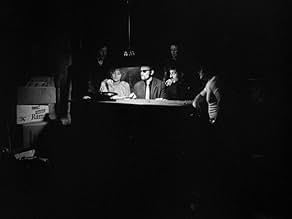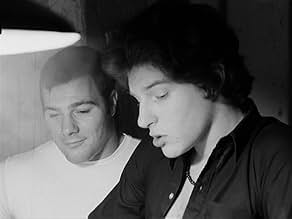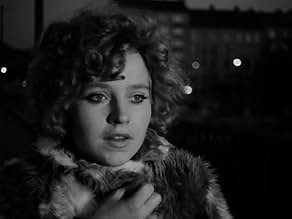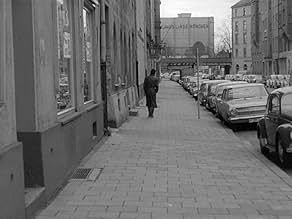NOTE IMDb
6,4/10
1,6 k
MA NOTE
Un homme est libéré de prison et trouve la société à l'extérieur peu attrayante. Avec plusieurs femmes et la police à ses trousses, il part à la recherche d'un vieil ami.Un homme est libéré de prison et trouve la société à l'extérieur peu attrayante. Avec plusieurs femmes et la police à ses trousses, il part à la recherche d'un vieil ami.Un homme est libéré de prison et trouve la société à l'extérieur peu attrayante. Avec plusieurs femmes et la police à ses trousses, il part à la recherche d'un vieil ami.
- Réalisation
- Scénario
- Casting principal
- Récompenses
- 2 victoires au total
Margarethe von Trotta
- Margarethe
- (as Margarete von Trotta)
Harry Baer
- Franz Walsch
- (as Harry Bär)
Günther Kaufmann
- Günther, 'Gorilla'
- (as Günther Kauffmann)
Carla Egerer
- Carla Aulaulu
- (as Carla Aulaulu)
Marian Seidowsky
- Marian Walsch
- (as Marian Seydowski)
Rainer Werner Fassbinder
- Pornokunde
- (non crédité)
Irm Hermann
- Barfrau
- (non crédité)
Eva Madelung
- Mädchen in der Damentoilette
- (non crédité)
Doris Mattes
- Marie Luise
- (non crédité)
David Morgan
- Catcher
- (non crédité)
Avis à la une
If only Bayer or Pfizer could bottle this movie for insomniacs, they'd make an even bigger fortune than they do now. Fassbinder proved he could fashion unique cinematic art out of a bunch of people standing around excoriating each other in several of his early pictures, but here the internal tensions never mount and the tropes don't connect. Some claim it to be a homage to film noir, and certainly there is alienation, paranoia and betrayal in spades, as well as iconic visual references to classics like Laura and Double Indemnity. But the moody lighting and framing in his excellent "The American Soldier" are much closer to the noir stylings of Alton and Planer than the arid non-style here.
However, the greatest offense of the film is the inclusion of a seemingly endless, static sequence featuring the playing of a phonograph record of a gimmicky children's tune about an oddball menagerie -- I guarantee you that this nauseating little ditty will echo in your skull for days. At the same time, the subtitlers are owed a great deal of credit for their incisively clever translation of the absurd rhyming couplets into (very British) English.
However, the greatest offense of the film is the inclusion of a seemingly endless, static sequence featuring the playing of a phonograph record of a gimmicky children's tune about an oddball menagerie -- I guarantee you that this nauseating little ditty will echo in your skull for days. At the same time, the subtitlers are owed a great deal of credit for their incisively clever translation of the absurd rhyming couplets into (very British) English.
"Gods of the Pest" (1970) with its hermetic title seems to be a clue-movie in the work of director Rainer Werner Fassbinder. Roughly speaking, it tells the story of Franz Walsh who has just been released from the Munich prison in Stammheim. We are not told for how long he was imprisoned, but the camera stands for considerable time on the signboard on which the name of the prison is written. Thus, we do not see either, if the Franz from "Gods of the Pest" is dizzy as is the Franz from Fassbinder's "Berlin Alexanderplatz" (1982), when they get back to liberty. But both Franz' take the tramway, as Piel Jutzi's Franz (and as Herzog's "Stroszek") does, our Franz '(as Piel Jutz's Franz and Stroszek) enters a restaurant, from where the story develops (in Fassbinder's Alexanderplatz Franz is picked up by the Jew Nachum, and it follows the famous Zannowich-story). Franz Walsch - a Fassbinder amalgamate from the Berlin Alexanderplatz-Franz Biberkopf and the American film director Raoul Walsh - now bears much more common features than only sharing his first name with the Alexanderplatz-Franz. However, when asked for his passport in the hotels, Franz Walsch tells the receptionist that his name is Franz Biberkopf. Both Franz'are former prison-inmates for whom there is no future now in the outside world. They have no other chance than to following up their former life that they had left before having been arrested. However, in the beginning, both Franz Walsch and Franz Biberkopf promise that they well stay honest. In the case of Franz Walsch, he stands between his old and the new girlfriend. The old one loves him too much and gets dangerous, the new one raises a credit, and both are astonished how quickly the money is used up. While Franz Biberkopf in the Alexanderplatz gets back to be a pimp, Franz Walsch and his former colleagues plan a coup ... . Despite being slightly different, one can say that "Gods of the plague" can be seen as Fassbinder's first finger-exercise towards filming Döblin's novel (which he would do only 9 years after the present movie). Meanwhile, Fassbinder himself appears as Franz Biberkopf in "The American Soldier", he hides himself behind the cutter of his movies "Franz Walsch", and there is hardly any Fassbinder film where there is no Franz or no Biberkopf: variations of the same topic: Franz Biberkopf from Alexanderplatz has to exercise himself in many characters, in many places and in many societies and times before he will find himself, almost at the end end of Fassbinder's life, in his ultimate form.
the movie seems to be random events and unconnected characters, but when i watched it the second time everything fell in place. the main character has just got out of jail (this is not explicit, but he walks by a long wall which seems to be circular and confining...see now that's art/clever)...so he gets out of jail and starts contacting people in his life, including girlfriend, brother, brothers abused wife, friends named gorilla and joe, etc...the lead actor did a wonderfull job of expressing the film's many ideologies, initially he seems expressionless but later you understand why he is the way he is...some themes are the trauma of jail (minimal actually), the petty crook mentality, girls and lovers and the futility of getting a job when one's only goal is to live, eat and love. The photography is high contrast black and white. Either they were copying old time russian directors or because they are from theatre they liked the lightning scheme, but i think they just wanted to jar the viewer's perspective and it works, never seen a movie with this type of photography. Highly recommended for the serious movie viewer. geocities.com/free_love98
After being released from prison, young Franz has to find his place in society, and police keeps an eye on him. First he briefly tries to live with his former girl friend who still loves him a bit too passionately, however he also picks up other acquaintances. Society is hostile to him, or at least perceived by him as being so, hence it is tough to make money. But he definitely wants to keep a cool lifestyle so he must keep on law-breaking, in particular when he is with his old betraying friends.
I think the more bitter you are, the more you understand a Fassbinder film. Some of them I just don't get at all, but in ten years time I should be there.
Something I always find so funny about Fassbinder's films is that he directed his actors -- with the exception of Hanna Schygulla, who had a very different, sensual aura -- to perform as if they would rather be anywhere else in the world but there; it's almost as if he's standing behind the camera with a loaded gun, forcing them to do it.. which may actually have been the case, now that I think about it. His films are more 'depressed' than 'depressing'. It's a style that not everyone can appreciate.
'Gods of the Plague' is an early Fassbinder film, a weird film noir crime tribute/pastiche with no jokes and some really interesting cinematography.
Something I always find so funny about Fassbinder's films is that he directed his actors -- with the exception of Hanna Schygulla, who had a very different, sensual aura -- to perform as if they would rather be anywhere else in the world but there; it's almost as if he's standing behind the camera with a loaded gun, forcing them to do it.. which may actually have been the case, now that I think about it. His films are more 'depressed' than 'depressing'. It's a style that not everyone can appreciate.
'Gods of the Plague' is an early Fassbinder film, a weird film noir crime tribute/pastiche with no jokes and some really interesting cinematography.
Le saviez-vous
- AnecdotesIn the hotel, Franz Walsch uses the pseudonym Franz Biberkopf. That's the name of title character of Alfred Döblin's famous novel "Berlin Alexanderplatz", which Fassbinder would adapt to a 13-part TV-miniseries later in his career.
- Citations
Margarethe: Why do they call you "the Gorilla"?
Günther: Because I'm big and strong... and everyone has to have a name.
- ConnexionsFeatured in The Story of Film: An Odyssey: Movies to Change the World (2011)
Meilleurs choix
Connectez-vous pour évaluer et suivre la liste de favoris afin de recevoir des recommandations personnalisées
- How long is Gods of the Plague?Alimenté par Alexa
Détails
- Date de sortie
- Pays d’origine
- Langues
- Aussi connu sous le nom de
- Gods of the Plague
- Lieux de tournage
- Dreimühlenstraße, Munich, Bavière, Allemagne(apartment where Marian is found dead)
- Société de production
- Voir plus de crédits d'entreprise sur IMDbPro
Box-office
- Budget
- 180 000 DEM (estimé)
- Montant brut aux États-Unis et au Canada
- 8 144 $US
- Week-end de sortie aux États-Unis et au Canada
- 11 623 $US
- 16 févr. 2003
- Montant brut mondial
- 8 158 $US
- Durée1 heure 31 minutes
- Couleur
- Mixage
- Rapport de forme
- 1.37 : 1
Contribuer à cette page
Suggérer une modification ou ajouter du contenu manquant

Lacune principale
By what name was Les dieux de la peste (1970) officially released in India in English?
Répondre






























